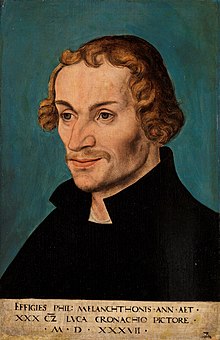Nikolaus Storch
He and his followers, known as the Zwickau Prophets, played a brief role during the early German Reformation years in south-east Saxony, and there is a view that he was a forerunner of the Anabaptists.
Prior to 1520, a splinter group broke away from this guild under Storch's leadership, a sect whose members believed that the source of true Christian belief came through visions and dreams.
During the winter of 1520–21, tensions in the town ran high between Catholics and reformers, plebeians and richer citizens, sects and town-council.
A number of disturbances took place in the town, usually involving the lower classes and frequently resulting in acts of violence against the Catholic monks.
On 14 April 1521, a 'Letter of the 12 Apostles and 72 Disciples' was posted up in the town, addressed to the Lutheran/Humanist reformer Johann Sylvanus Egranus, who had crossed swords with Müntzer and Storch on several occasions already.
It enumerated, in verse, all the false doctrines of Egranus, his denial of the suffering of the soul, his worship of the ‘world’ and of money, and his preference for the company of 'bigwigs' : "And you seek mere chattles, cash and praise, But that’s the last thing you'll get from the 72 Disciples, And just watch what you'll get from the 12 Apostles, And then even more from the Master... And we want to prove in writing that you're an arch-heretic" [2] In a defamatory letter of that same month, Müntzer was depicted thus: “at that time preacher at St Katharine’s, [he] made them [the Storchites] his supporters, won over the weavers, particularly one named Nichol Storch, whom he praised so mightily from the pulpit, raised him above all other priests as the only one who knew the Bible better and who was highly favoured by the Spirit...that Storch dared to give corner-sermons beside Thomas...
Nothing daunted, in mid-December 1521, he, along with Markus Stübner and Thomas Drechsel, turned up in Wittenberg to argue their interpretation of the reforms before the 'official' leaders.
Luther was sitting at that time in the Wartburg Castle, whither he was spirited in April 1521 after the Imperial Diet at Worms, so it was left to his lieutenant Philipp Melanchthon and Nikolaus von Amsdorf to greet and debate with Storch, specifically on visions and baptism.
Certain things persuade me not to condemn them... No one other than Martin can judge them more closely...” [5] In a covering note to Friedrich’s chaplain, Georg Spalatin, Melanchthon added: "The Holy Spirit is in these men..." The reaction of this leader of the Wittenberg movement was quite surprising; anyone without university training or a theological education was generally given short shrift; in later years, most unordained reformed preachers were regarded as 'Anabaptists'.
It is suggested that he spent some years in the west of Thuringia, and Luther reported that he was active in Andreas Karlstadt's town of Orlamünde in March 1524.
A warning was issued by the Nuremberg preacher Dominicus Sleupner to the Strasburg town-council who stated that Storch was in their town in December 1524.
According to the chronicler Enoch Widmann, Storch was in the Bavarian town of Hof at the end of 1524, working as a weaver, but still preaching and gaining followers.
The letter was probably written by the new Lutheran preacher at St Mary's Church, Nikolaus Hausmann: "some men doubted whether the belief of the godfather can be of use in the baptism.
He also said that saints and the Elect would reign after the destruction of the Godless, and that, under his leadership, all the kings and princes of the world would be killed and the Church would be cleansed.
He invented certain worthless tricks with which he intended to prepare men for the reception of the Spirit: if they spoke little, dressed poorly and ate poorly and together demanded the Holy Spirit of God..."[7] The Lutheran Mark Wagner listed eight articles of faith proposed by Storch, which included: a condemnation of the ‘Christian’ institution of marriage, whilst propagating the idea that ‘anyone can take women whenever his flesh commands him...and live with them promiscuously as he wishes’; a call for the communalisation of property; an invective against secular and ecclesiastical authorities; arguments against infant baptism - but not, incidentally, in support of adult baptism; condemnation of the ceremonies of the Church; and a proclamation of Free Will in matters of faith.

